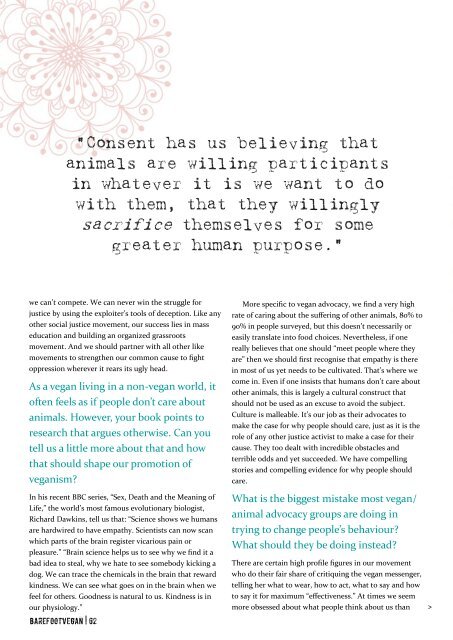Barefoot Vegan Mag Jan_Feb 2017
Create successful ePaper yourself
Turn your PDF publications into a flip-book with our unique Google optimized e-Paper software.
“Consent has us believing that<br />
animals are willing participants<br />
in whatever it is we want to do<br />
with them, that they willingly<br />
sacrifice themselves for some<br />
greater human purpose.”<br />
we can’t compete. We can never win the struggle for<br />
justice by using the exploiter’s tools of deception. Like any<br />
other social justice movement, our success lies in mass<br />
education and building an organized grassroots<br />
movement. And we should partner with all other like<br />
movements to strengthen our common cause to fight<br />
oppression wherever it rears its ugly head.<br />
As a vegan living in a non-vegan world, it<br />
often feels as if people don’t care about<br />
animals. However, your book points to<br />
research that argues otherwise. Can you<br />
tell us a little more about that and how<br />
that should shape our promotion of<br />
veganism?<br />
In his recent BBC series, “Sex, Death and the Meaning of<br />
Life,” the world’s most famous evolutionary biologist,<br />
Richard Dawkins, tell us that: “Science shows we humans<br />
are hardwired to have empathy. Scientists can now scan<br />
which parts of the brain register vicarious pain or<br />
pleasure.” “Brain science helps us to see why we find it a<br />
bad idea to steal, why we hate to see somebody kicking a<br />
dog. We can trace the chemicals in the brain that reward<br />
kindness. We can see what goes on in the brain when we<br />
feel for others. Goodness is natural to us. Kindness is in<br />
our physiology.”<br />
More specific to vegan advocacy, we find a very high<br />
rate of caring about the suffering of other animals, 80% to<br />
90% in people surveyed, but this doesn’t necessarily or<br />
easily translate into food choices. Nevertheless, if one<br />
really believes that one should “meet people where they<br />
are” then we should first recognise that empathy is there<br />
in most of us yet needs to be cultivated. That’s where we<br />
come in. Even if one insists that humans don’t care about<br />
other animals, this is largely a cultural construct that<br />
should not be used as an excuse to avoid the subject.<br />
Culture is malleable. It’s our job as their advocates to<br />
make the case for why people should care, just as it is the<br />
role of any other justice activist to make a case for their<br />
cause. They too dealt with incredible obstacles and<br />
terrible odds and yet succeeded. We have compelling<br />
stories and compelling evidence for why people should<br />
care.<br />
What is the biggest mistake most vegan/<br />
animal advocacy groups are doing in<br />
trying to change people’s behaviour?<br />
What should they be doing instead?<br />
There are certain high profile figures in our movement<br />
who do their fair share of critiquing the vegan messenger,<br />
telling her what to wear, how to act, what to say and how<br />
to say it for maximum “effectiveness.” At times we seem<br />
more obsessed about what people think about us than ><br />
BAREFOOT<strong>Vegan</strong> | 62





